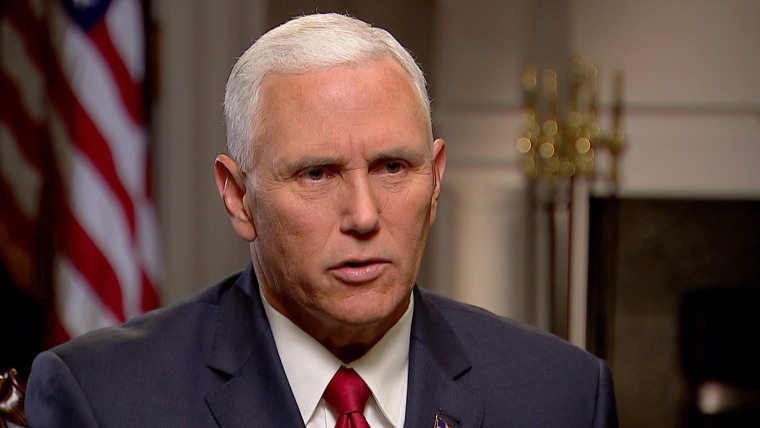Vice President Mike Pence on Tuesday championed President Donald Trump's new policy approach on the war in Afghanistan, while failing to disclose any details for how long the United States would remain there and with how many troops.
He also mirrored Trump's tough language on Pakistan — which has been accused of shielding insurgent fighters — and said that the U.S. is "putting them on notice. They need to step up as a partner."
Pence, speaking in the White House with TODAY's Matt Lauer, stood firmly in line with Trump — backing him on Afghanistan as well as the president's response in the days after deadly violence flared in Charlottesville, Virginia, this month.
Lauer first focused on Trump's televised speech Monday night in which he pledged to remain in Afghanistan — a clear shift from his past remarks and tweets that America should pull its troops from the war-torn country.
When Lauer asked Pence if the strategy is now an open-ended commitment, and how many U.S. service members could be sent to Afghanistan, the vice president said any number will "be based on the conditions on the ground."
He added that the Pentagon this year has already proposed adding 4,000 additional troops in Afghanistan as part of a larger strategy to root out terrorists that have gained a foothold since the war began 16 years ago.
But Pence wouldn't confirm if that number of additional troops is what could be dispatched overseas.
Related: Trump Vows Victory in Afghanistan, Stays Silent on Troop Levels
"I think it's yet to be seen, and we'll certainly be making that information available as the president receives recommendations," the vice president said.
Defense Secretary James Mattis said Tuesday that he'll make a decision on how many troops to send to Afghanistan after receiving a report from the chairman of the Joint Chiefs of Staff.
"When he brings that to me, I will determine how many more we need to send in," he told reporters during a visit to Iraq, according to Reuters. He said that decision, "may or may not be the number that is bandied about."
Pence added that U.S. troops in Afghanistan are there to assist the Afghan military at the brigade level, but that it remains the Afghans "at the tip of the spear in this fight" and America is there to "assist them in their fight against the Taliban, in their fight against the Haqqani network, Al Qaeda, ISIS."
"We're there to help the Afghans win," Pence said, "and the president made a commitment that we're going to be there until we win."
On Monday night, Trump failed to provide any substantial details about what the U.S. plans to do to aid the Afghan government, which has struggled to keep the nascent democracy secure against Taliban and Al Qaeda fighters. He also wouldn't identify benchmarks for success and specify if more American troops will be brought in to supplement the 8,400 currently there.
"We will not talk about numbers of troops or our plans for further military activities," Trump said during his prime-time address to the nation from Fort Myer in Arlington, Virginia. "Conditions on the ground, not arbitrary timetables, will guide our strategy from now on."
Trump made clear that other countries in the region, including India and Pakistan, must stand with the U.S., and accused Pakistan of "housing the very terrorists that we are fighting." Pakistani military officials have denied that claim.
The previous Obama and Bush administrations opted for diplomacy and financial aid for coaxing Pakistan to work in a regional alliance.
"Pakistan has much to gain from partnering with our effort in Afghanistan," Trump said. "It has much to lose by continuing to harbor criminals and terrorists."
The War In Afghanistan: By the Numbers
On Tuesday, Lauer asked Pence that if Pakistan doesn't "toe the line," would the president declare it a "state sponsor of terrorism?"
"What the president said last night to Pakistan is that we're putting them on notice. They need to step up as a partner," the vice president said. "And if they want to see the United States continue to partner with them for security in the region, they need to do more to confront the terrorist organizations that are using particularly northern Pakistan ... as a safe haven."
Pence also defended Trump on another issue gripping the U.S.: The racial division resulting from the white nationalist rally in Charlottesville. Trump was condemned by both Democrats and Republicans in the days that followed after he blamed both white nationalists and counter-protesters for what happened.
"There was no moral equivalency drawn by the president," Pence said, adding that Trump repeatedly denounced white supremacists.
Lauer casted Pence as a "loyal defender of Trump," but asked him if he put his loyalty above "what's in your heart and your gut" after the president's controversial Charlottesville comments.
"I know this president. I know his heart. And I heard him. I heard him on the day that the Charlottesville tragedy happened, when he denounced hate and violence in all of its forms from wherever it comes," Pence said.
"We understand that criticism comes with this job," he added, "and this president has the broad shoulders to be able to take it."

